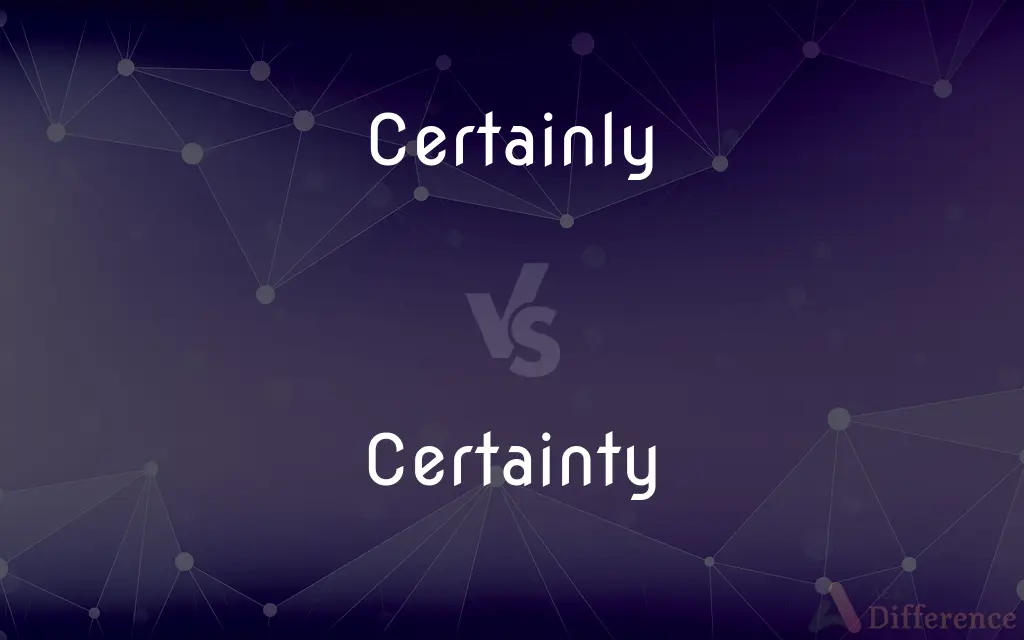Certainly vs. Certainty — What's the Difference?
Edited by Tayyaba Rehman — By Fiza Rafique — Updated on March 18, 2024
Certainly is an adverb expressing affirmation or agreement without doubt, focusing on the manner of being sure. Certainty is a noun denoting the state of being completely confident or having no doubt about something.

Difference Between Certainly and Certainty
Table of Contents
ADVERTISEMENT
Key Differences
Certainly is used to convey a strong affirmation or agreement in response to a question or statement, expressing confidence in the truth or inevitability of an assertion. It underscores the speaker's assurance and often serves to reassure or confirm. Whereas certainty is the condition or quality of being absolutely sure or convinced about the truth of something. It represents a state of mind free from doubt or the objective fact of being true beyond dispute.
When someone uses "certainly" in conversation, they are typically signaling their agreement or permission in a way that leaves no room for doubt. It's a word that communicates a high degree of confidence in the outcome or truth of a matter. On the other hand, when discussing certainty, one is referring to an absolute level of sureness either about their knowledge, beliefs, or the predictability of something in the external world.
Certainly can also be used to emphasize the reliability or likelihood of an event or action, indicating that something is expected to happen without fail. This use of the word pertains to the speaker's attitude towards an assertion or proposal. Certainty, however, can be applied more broadly to describe a general state or condition where outcomes are known and predictable, or where beliefs are held without any doubt.
In practical terms, "certainly" enhances statements or responses with a tone of strong affirmation, often making communication clearer and more decisive. It functions as a linguistic tool for expressing unwavering confidence or consent. Certainty, as a concept, is fundamental to human cognition and decision-making, reflecting our understanding of reality, the validity of our knowledge, and our confidence in predictions.
While "certainly" can influence the tone and perceived reliability of communication, certainty affects the way individuals perceive and interact with the world around them. The former is about expressing a clear, confident stance, while the latter concerns the underlying state of being convinced about the truth or falsity of propositions, the feasibility of plans, or the reliability of knowledge.
ADVERTISEMENT
Comparison Chart
Part of Speech
Adverb
Noun
Definition
Expresses strong affirmation, agreement, or confidence in a statement.
The state of being free from doubt or the quality of being sure.
Usage
Used to assure, confirm, or agree with something stated or asked.
Describes a condition or quality of absolute truth or conviction.
Example
"Will you be attending the meeting?" "Certainly, I wouldn’t miss it."
"His certainty about the success of the project was contagious."
Significance
Enhances communication with decisiveness and assurance.
Reflects a mental state or objective fact of being beyond dispute.
Compare with Definitions
Certainly
Offers reassurance.
You can certainly count on my support.
Certainty
Quality of being absolutely sure.
With certainty, she predicted the outcome of the experiment.
Certainly
Expresses affirmation or agreement.
Certainly, we can adjust the schedule to accommodate your needs.
Certainty
Reflects a high degree of confidence.
His certainty about the decision made the team feel secure.
Certainly
Enhances the certainty of statements.
Certainly, this approach seems the most effective.
Certainty
Used to describe predictable outcomes.
The certainty of sunrise and sunset is based on Earth's rotation.
Certainly
Indicates likelihood or assurance.
The event will certainly attract a lot of attention.
Certainty
State of being without doubt.
The certainty of his conviction was evident in his speech.
Certainly
Undoubtedly; definitely
This is certainly not my writing.
Certainty
Denotes something known to be true.
The certainty of the law is crucial for justice.
Certainly
By all means; of course
You may certainly join us.
Certainty
The quality of being established as true
The certainty that the earth orbits the sun.
Certainly
Surely
They certainly are hard workers.
Certainty
Certainty (also known as epistemic certainty or objective certainty) is the epistemic property of beliefs which a person has no rational grounds for doubting. One standard way of defining epistemic certainty is that a belief is certain if and only if the person holding that belief could not be mistaken in holding that belief.
Certainly
In a way which is certain; with certainty.
Certainty
Inevitability
The certainty of death.
Certainly
Without doubt, surely.
The accident was certainly caused by human error.
That was certainly sweet of him.
You may certainly join us for dinner.
Certainty
Confidence; assurance
His certainty that things would get better.
Certainly
An emphatic affirmative answer; of course.
Would you like it with ice?
Certainly, and with lemon please.
Certainty
Something that is clearly established or assured
"On the field of battle there are no certainties" (Tom Clancy).
Certainly
Without doubt or question; unquestionably.
Certainty
The state of being certain.
Certainty
An instance of being certain.
Certainty
A fact or truth unquestionably established.
Certainty
The quality, state, or condition, of being certain.
The certainty of punishment is the truest security against crimes.
Certainty
A fact or truth unquestionable established.
Certainties are uninteresting and sating.
Certainty
Clearness; freedom from ambiguity; lucidity.
Certainty
The state of being certain;
His certainty reassured the others
Certainty
Something that is certain;
His victory is a certainty
Common Curiosities
How is certainty important in decision-making?
Certainty is crucial in decision-making as it allows individuals to make choices with confidence, knowing the outcomes are predictable or true.
Is certainty always achievable?
While certainty is desirable, it's not always achievable due to the inherent unpredictability of some events and the limitations of knowledge.
Can "certainly" be used to express doubt?
No, "certainly" is used to express a lack of doubt, indicating agreement or assurance.
How does certainty affect beliefs?
Certainty strengthens beliefs, making them more resilient to doubt and more likely to guide actions and decisions.
Why do people seek certainty?
People seek certainty for psychological comfort, to reduce anxiety over unknowns, and to make informed decisions.
How does "certainly" differ in informal vs. formal contexts?
In informal contexts, "certainly" might be used more liberally as a polite affirmation, while in formal contexts, it may signal assured consent or confirmation.
How can certainty be communicated?
Certainty can be communicated through clear, decisive language, and by providing evidence or reasoning to support assertions.
What is the relationship between certainty and knowledge?
Certainty is a component of knowledge, representing the degree to which someone is convinced of the truth of their knowledge.
What does "certainly" convey in communication?
"Certainly" conveys strong affirmation, agreement, or confidence, often used to assure or confirm.
Can the use of "certainly" affect the tone of a conversation?
Yes, using "certainly" can make a conversation more positive and assertive by conveying strong agreement or affirmation.
Is it possible to be too certain?
Yes, being overly certain without adequate evidence can lead to mistakes and hinder open-mindedness and learning.
Is there a difference between feeling certain and being right?
Yes, one can feel certain about something and still be incorrect, as feelings of certainty don't guarantee the accuracy of one’s beliefs or conclusions.
Does certainty play a role in scientific research?
Yes, certainty is important in scientific research for developing theories and models that accurately describe and predict phenomena.
Can certainty change over time?
Yes, certainty can change as new information becomes available, leading to revised understandings and beliefs.
How can one increase their level of certainty?
Increasing certainty typically involves gathering more information, engaging in thorough analysis, and seeking corroborating evidence.
Share Your Discovery

Previous Comparison
Andiron vs. Firedog
Next Comparison
Passage vs. StoryAuthor Spotlight
Written by
Fiza RafiqueFiza Rafique is a skilled content writer at AskDifference.com, where she meticulously refines and enhances written pieces. Drawing from her vast editorial expertise, Fiza ensures clarity, accuracy, and precision in every article. Passionate about language, she continually seeks to elevate the quality of content for readers worldwide.
Edited by
Tayyaba RehmanTayyaba Rehman is a distinguished writer, currently serving as a primary contributor to askdifference.com. As a researcher in semantics and etymology, Tayyaba's passion for the complexity of languages and their distinctions has found a perfect home on the platform. Tayyaba delves into the intricacies of language, distinguishing between commonly confused words and phrases, thereby providing clarity for readers worldwide.














































